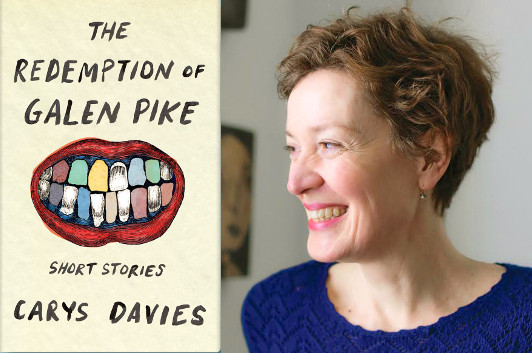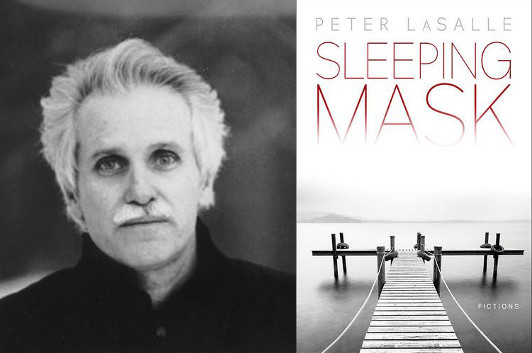Carys Davies’ Brief Drama of the Soul

photo: Emily Atherton
The Redemption of Galen Pike, the Frank O’Connor International Short Story Award-winning collection from Carys Davies, takes readers to a lot of different places. The title story is set in a Colorado frontier town, where a virtuous Quaker woman comes each day to the cell where a murderer awaits his execution; other stories show readers a tense encounter between two isolated souls in the early days of Australian settlement, a lonely man who tells Queen Victoria the lurid story of his marriage’s end, a tragic scene played out in a Siberian hostel… Davies’ dramas are already stark, but they stand out even more aggressively in these settings, each one hitting home with unerring effect, even if—as will be the case with that title story—you think it’s veering into genre stereotype. In this guest post, Davies explains how she learned to identify the moments in her characters’ lives that make for great short stories.
People ask me all the time what it is I love about short stories, and why I write them.
It all began for me back in the mid-1990s. I was living in Chicago, working as a journalist. I had four small children, life was very busy, chaotic, and one day for a breather my husband and I took the kids to Powell’s bookshop where I came across a copy of Eudora Welty’s Collected Stories. It had a brown 1960s-ish cover and while the children ran amok in the aisles I sat down on the floor and read one of the stories: “Death of A Traveling Salesman.”
16 May 2017 | selling shorts |
Peter LaSalle’s Pursuit of Borges

photo: Alex S. MacLean
There’s some odd little moments in Peter LaSalle’s Sleeping Mask. And I’m not just thinking about the story where a man walks out of an airplane lavatory and slowly begins to realize he’s somehow wound up on an otherwise empty plane, still en route to… well, he’s not quite sure. There’s also the couple that dines at a restaurant in a Mexican border town and never realizes that it’s been taken over by a local drug lord, or the child soldiers who decide to kidnap the girls from a local orphanage and quickly find themselves no longer in charge of the situation. Even the more quotidian stories, like the day in the life of a university professor, have a detached, almost abstract quality to them. And then there’s the one about Edgar Allan Poe that’s a pitch-perfect academic paper… actually, that’s probably a good segue into this essay, where LaSalle pays tribute to another writer who liked to play with the boundaries between reality and fiction as well.
Well, when it comes to my inspiration as a short story writer, even awe, I often acknowledge the Argentine master of the genre, Jorge Luis Borges, and the collection Ficciones. It’s a book that by dint of sheer innovation—summoning the metaphysical, bravely and somehow magically pushing against the limits of past literature, a true clarion call announcing postmodernism—probably widened the possibilities of serious fiction forever after first appearing from a small Buenos Aires publisher in 1944.
I can admit it was a rather meandering road that eventually led me to such admiration. Oddly, I saw Borges before I’d ever read a word of his work. I was a Harvard sophomore in 1967 and my roommate was a fellow English major, a guy more sophisticated than me in matters literary (though one wonders how sophisticated either of us could be, he from a suburban Salt Lake City high school and I from an unknown private Catholic boys school, a pretty medieval operation, in the nowheresville of semi-rural Rhode Island). Excited, he told me that a very important writer was on campus to lecture that year, under of the auspices of the long-established and prestigious Charles Eliot Norton Lectures series. He assured me that this Jorge Luis Borges was a figure easily on par with Beckett and we must attend.
So one snowy Cambridge evening we set out together to Sanders Theatre, a big teacup of a lecture hall in the campus’s old, spookily turreted Memorial Hall. I watched a smiling blind man being led onto the stage; his hair was silvery, his black suit well tailored. He spoke with a rather antiquated British accent, and I know I didn’t understand much of what he said. My lack of comprehension wasn’t because of the accent but due to the fact that the content was obviously well beyond me at the time: deep insight concerning the mystery of metaphor, also the paradoxically illogical logic of dream in literature, etc.—such being some of his subjects, as I learned later when reading a book that transcribed those Harvard talks.
I guess what stuck with me at age 20, above all else, was the very image of him, elderly, blind, continuing to gently smile and erudite to a dazzling degree—he appeared nothing short of Homeric, an archetypical Poet and icon for Literature itself, all right.
24 April 2017 | selling shorts |

 Our Endless and Proper Work is my new book with Belt Publishing about starting (and sticking to) a productive writing practice.
Our Endless and Proper Work is my new book with Belt Publishing about starting (and sticking to) a productive writing practice. 
